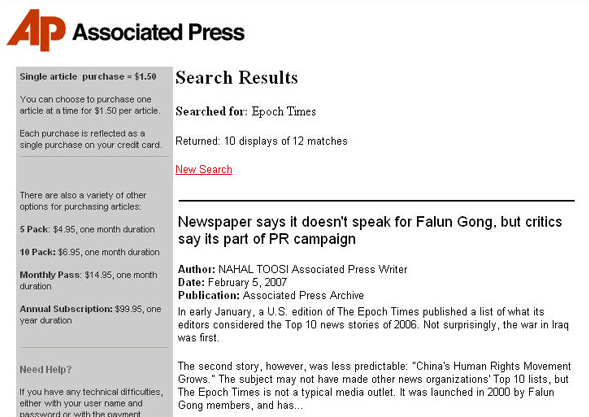In early January, a U.S. edition of The Epoch Times published a list of what its editors considered the Top 10 news stories of 2006. Not surprisingly, the war in Iraq was first. The second story, however, was less predictable: "China's Human Rights Movement Grows."
The subject may not have made other news organizations' Top 10 lists, but The Epoch Times is not a typical media outlet. It was launched in 2000 by Falun Gong members, and has since rapidly expanded its Web and print presence.
As it has grown, The Epoch Times has tried to carve a place for itself in the mainstream media while distinguishing itself from Falun Gong, a spiritual movement the Chinese government has banned and denounced as a cult.
"It's not a Falun Gong newspaper," said Stephen Gregory, chairman of the board for English-language editions. "Falun Gong is a question of an individual's belief. The paper's not owned by Falun Gong, it doesn't speak for Falun Gong, it doesn't represent Falun Gong. It does cover the persecution of Falun Gong in China."
Some observers aren't convinced. They say The Epoch Times appears to be a major element of a global public relations campaign by Falun Gong to gain sympathy and new followers.
"This is a strategy for the Falun Gong to expand its outreach to the non-followers and non-believers of Falun Gong," said Ming Xia, a political science professor at the College of Staten Island. "To some degree, Epoch Times indicates a part of the Falun Gong strategy to embed itself into the large civil society for influence and legitimacy."
Several messages seeking comment from Chinese embassy officials in Washington were not returned. In the past, officials have called The Epoch Times as "a propaganda tool."
[E&P note: The paper's Web site today boasts the following headlines near the top: "Chinese Officials Still Killing Falun Gong for Organs, Report Says," "China Editor Makes Bold Call for Democracy" and "China Bars AIDS Doctor From U.S. for Award."]
Falun Gong is a broad, loosely based movement that combines parts of Buddhism, Taoism and the ideas of its founder, Li Hongzhi, with meditation and simple exercises. It lacks a central hierarchy, so to say it "owns" something can be technically inaccurate. But many Epoch Times staffers, including Gregory, are part of the movement.
The movement, which drew millions of followers throughout the 1990s, was outlawed in 1999 after adherents staged a massive demonstration outside the Chinese government's main compound in Beijing. Thousands were jailed or sent to labor camps as the government tried to discredit and eradicate the sect, which officials view as a threat to social stability and communist rule.
The Epoch Times began as a Web site based in an Atlanta suburb after its founders grew alarmed about what was happening to fellow Falun Gong members in China, Gregory said.
It has since blossomed into a large operation that has offices in 30 countries, publishes in 17 languages on the Web and 10 languages in print, and boasts total weekly circulation of 1.4 million.
English editions in New York are weeklies, and at the top, they promise "A fresh look at our changing world." The word "epoch" means a distinctive period of time.
A recent English edition in New York had front-page stories about the warm weather and the papers of Martin Luther King Jr. The news organization's coverage of China, however, is strident and critical. Reports have included stories about China allegedly harvesting the organs of Falun Gong members.
Gregory said Epoch Times correspondents in China have been harassed, imprisoned and tortured. Some of the incidents have been documented by the Committee to Protect Journalists. The paper reaches the Chinese through travelers and people who circumvent Internet censors.
Gregory says the paper provides coverage that is lacking from Western media outlets and state-run news outlets in China.
It is unclear exactly who owns the paper and how it receives much of its funding. An Associated Press reporter was allowed a brief visit to The Epoch Times headquarters in Manhattan, but wasn't allowed to interview anyone beyond Gregory.
"If we were to discuss who the ownership is, I believe that would put them in a situation in which they would be under a great deal of pressure," Gregory said.
Many Chinese business and community leaders are wary of The Epoch Times because they worry its Falun Gong connections could endanger their relations with Chinese authorities. Gregory said those who advertise in the paper often get calls from the Chinese consulate telling them not to.
An Epoch Times reporter shouted at Chinese President Hu Jintao during a White House ceremony in 2006. Soon afterward, The Epoch Times and the reporter, who had been deeply involved in the organ-harvesting stories, agreed she should leave the staff, Gregory said.
(Associated Press, February 5, 2007)
Original text from: http://www.editorandpublisher.com/eandpews/article_display.jsp?vnu_content_id=1003541682


